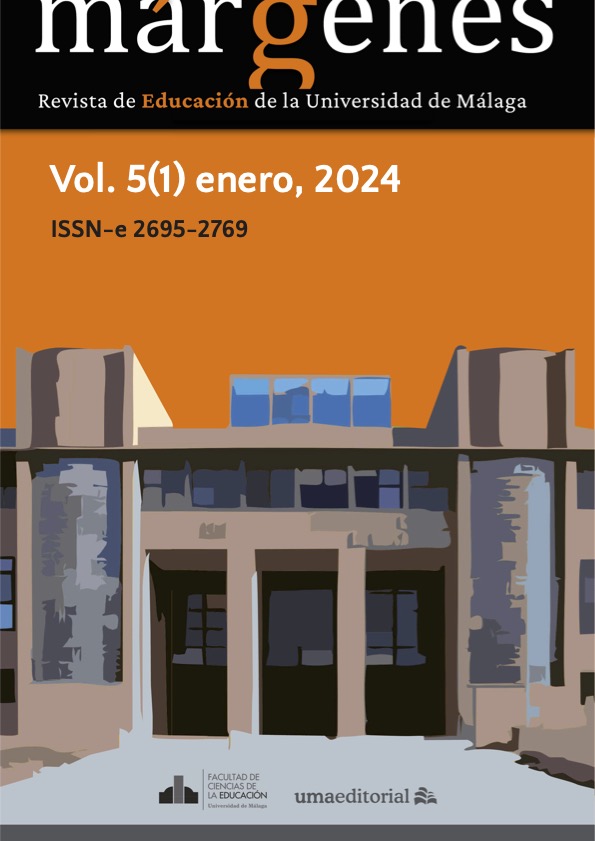La educación y la vergüenza filosófica
DOI:
https://doi.org/10.24310/mar.5.1.2024.18365Palabras clave:
vergüenza, pudor, relación educativa, filosofía, erosResumen
A menudo olvidada e ignorada, la vergüenza es un sentimiento de un valor moral indiscutible. Es signo de responsabilidad en un mundo convulso, expresión manifiesta de un trauma provocado por algún tipo de violencia o motor de la acción para el cambio y, en este sentido, revolucionaria. En este texto se reflexiona acerca del vínculo entre filosofía, vergüenza y educación, y se defiende, en primer lugar, que la tarea central de la filosofía, entendida como una forma de vida y como transformación, es avergonzar sin humillar, colocando al ser humano ante su propia ignorancia; en segundo término, se afirmará que es signo de una educación verdaderamente humana la capacidad para sentir vergüenza, entendida como nodriza de la educación. Lo que aquí se sostiene, entonces, es el valor educativo de una suerte de vergüenza filosófica.
Descargas
Métricas
Citas
Anders, G. (2011). La obsolescencia del hombre. Pre-Textos.
Char, R. (2002). Furor y misterio. Visor.
Gross, F. (2023). La vergüenza es revolucionaria. Taurus.
Kearney, R. (1998). La paradoja europea. Tusquets.
Levi, P. (2005). Trilogía de Auschwitz. El Aleph ediciones.
Lévinas, E. (1982). De l’evasion. Fata Morgana.
Mèlich, J-C. (2021). La fragilidad del mundo. Ensayo sobre un tiempo precario. Tusquets.
Nietzsche, F. (1998). Así habló Zaratustra. Alianza editorial.
Nucci, M. (2020). El abismo de Eros. Arpa editorial.
Nussbaum, M. C. (2006). El ocultamiento de lo humano. Repugnancia, vergüenza y ley. Katz editores.
Platón (1997). Banquete, en Diálogos, vol. III. Gredos.
Platón (2019). Lisis, en Diálogos, vol I. Gredos,
Sánchez Ferlosio, R. (2011). «El alma y la vergüenza», en Carácter y destino (pp. 180-216). Ediciones Universidad Diego Portales.
Publicado
Cómo citar
Número
Sección
Licencia
Derechos de autor 2024 Márgenes Revista de Educación de la Universidad de Málaga

Esta obra está bajo una licencia internacional Creative Commons Atribución-SinDerivadas 4.0.
En la Revista Márgenes apostamos claramente por una política de acceso abierto del conocimiento científico (Veáse Declaración de Berlín).
Aquellos autores/as que tengan publicaciones con esta revista, aceptan los términos siguientes:
-
Esta revista provee acceso libre inmediato a su contenido bajo el principio de hacer disponible gratuitamente la investigación al público. Todos los contenidos publicados en Márgenes, están sujetos a la licencia de Creative Commons Reconocimiento-SinObraDerivada 4.0 Internacional.
Es responsabilidad de los autores/as obtener los permisos necesarios de las imágenes que están sujetas a derechos de autor.
Los autores-as cuyas contribuciones sean aceptadas para su publicación en esta revista conservarán el derecho no exclusivo de utilizar sus contribuciones con fines académicos, de investigación y educativos, incluyendo el auto-archivo o depósito en repositorios de acceso abierto de cualquier tipo.
La edición electrónica de esta revista esta editada por la Editorial de la Universidad de Málaga (UmaEditorial), siendo necesario citar la procedencia en cualquier reproducción parcial o total.
- Los-as autores-as podrán adoptar otros acuerdos de licencia no exclusiva de distribución de la versión de la obra publicada (p. ej.: depositarla en un archivo telemático institucional o publicarla en un volumen monográfico) siempre que se indique la publicación inicial en esta revista.
- Se permite y recomienda a los-as autores-as difundir su obra a través de Internet (p. ej.: en archivos telemáticos institucionales o en su página web) antes y durante el proceso de envío, lo cual puede producir intercambios interesantes y aumentar las citas de la obra publicada. (Véase El efecto del acceso abierto).
















